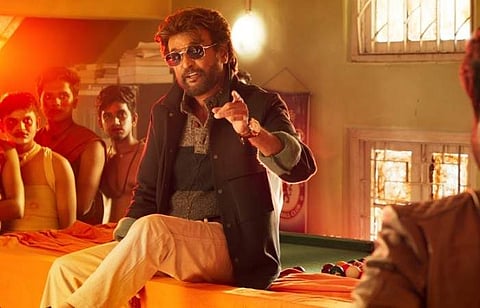

Somewhere near the beginning of Petta, there’s a scene that has Anwar (Sananth) requesting Kaali (Rajinikanth) for help in dealing with issues in his romantic relationship. Something passes in Kaali’s eyes, as he seems to grapple with the gravity of the request. He seems momentarily shaken, but recovers quickly: “Panniduvom!” In barely a couple of seconds, he registers that this is no ordinary moment, that something substantial is behind his look of surprise. There’s nostalgia there, a hint of sadness, some weary amusement at the complex ways of the world. You understand all the layers only in the second half of the film, and when you do, you appreciate Rajinikanth’s performance better. Regardless of whether it’s a small scene like this or a momentous one like the Kabali reunion scene (which director Karthik Subbaraj believes should be studied in film schools), it’s rather curious how Rajinikanth’s excellence as a performer gets so little commentary. People talk about the pace of his dialogue delivery, the style of his body language, the uniqueness of his walk, but about his mettle as an actor, there’s always been precious little.
Take one of his defining films, Annamalai, for instance. They talk about that lengthy monologue, they talk about the auction scene, they talk about him blowing cigarette smoke on Sarath Babu’s face… but what about, say, the scene in which he has a conversation with his daughter, after discovering to his annoyance that she’s in love with the son of his best-friend-turned-sworn-enemy. He begins as a calm, mature father, but in less than two minutes, moves through rage to eventually, resigned sadness. And somehow, he also manages to convey the burden of an unhappy man who’s hidden a lifetime of sorrow under a layer of vengeance. It’s just so deliciously complicated and beautiful.
It must have something to do with all the mass films he’s done. There’s always been a tendency for people to get swayed by the mass moments in such films, and not make much about any excellent performances within. For the mass moments to work, of course, they need to be built on a solid foundation of emotion. Petta wreaking havoc on a bunch of rowdies is mass, but only when it’s flavoured with his responsibility of having to protect so many innocent students, and his likely guilt at having brought the fight to a place of education. There’s another layer too, but I won’t spoil it for those of you who haven’t seen the film yet.
Almost every memorable mass film of Rajini’s has at least one scene in which his excellent performance has not been given its due, even if the scene itself is popular. In Muthu, it’s when he effortlessly moves from rage at his horses being attacked, to shock and confusion and dejection at his friend/boss’s apathy towards him. In Baasha, it’s when he is untied from the pole after taking incredible punishment and gets asked by his brother why he didn’t as much as raise an eyebrow in protest. His reaction is an inexplicable mix of compassion, and the sagely ability to laugh at life’s ironies. In Panakaaran, it’s when he hunts for information about his parents. He’s an adult, and at once, he’s a child desperately in need of love. In Dharmadurai, it’s when he laughs and cries and does them both at once, when his brothers and their friends laugh at the simpleton he is. In Thalapathy, it’s when he learns about the identity of his mother, and moves from curiosity to denial to acceptance to shame, all in one scene. In Padikaadhavan, it’s when his brother insults him for his lack of ambition, and he sheds a tear and says, “Yes, yes, thank you.” The same dialogues he used earlier to comic effect. I could go on, but you see the point.
In being overwhelmed by his stylish presence, it’d be a gross neglect of his ability as an actor if we didn’t pay attention to these moments in his films. It’d be unfair to our admiration for him, if we failed to acknowledge the actor beneath the veneer of superstardom. In a recent conversation with Petta’s director, Karthik Subbaraj, he spoke about how the Superstar wasn’t sure if people would accept him if he did a love film devoid of the mass moments people seem to expect from him. Who knows, in between all our collective praise for his style, perhaps if we spent a breath or two also discussing his excellence as an actor, he may just start to believe in it himself. On some level, it seems even he underrates himself. If that doesn’t make you sad…